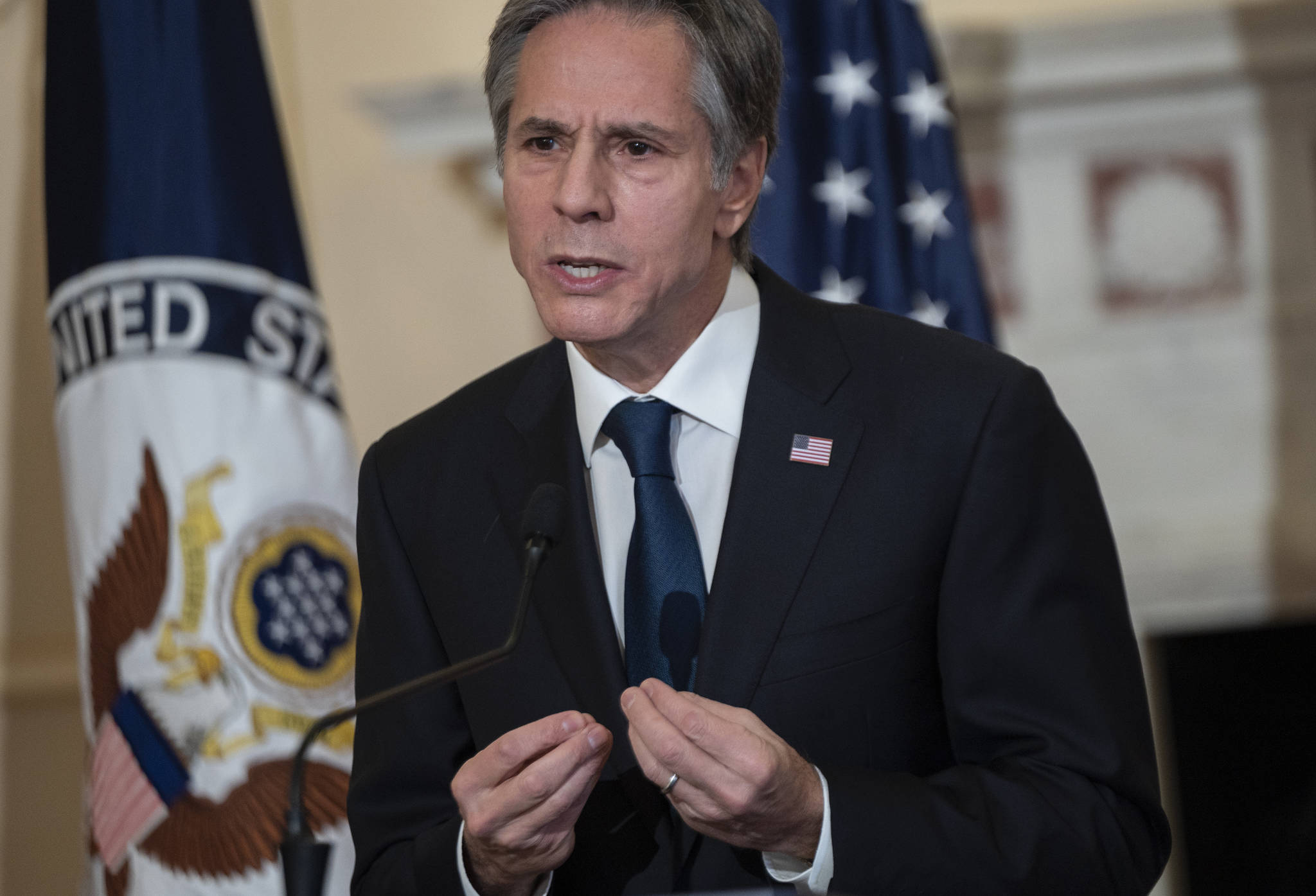By Matthew Lee
AP Diplomatic Writer
WASHINGTON — The United States and China will face a new test in their increasingly troubled relations when top officials from both countries meet in Alaska on Thursday.
Ties between the world’s two largest economies have been torn for years, and the Biden administration has yet to signal it’s ready or willing to back down on the hard-line stances taken under President Donald Trump. Nor has China signaled it’s prepared to ease the pressure it has brought to bear.
Thus, the stage is set for a contentious first face-to-face meeting, and no agreements are expected.
Secretary of State Antony Blinken and national security adviser Jake Sullivan will meet China’s top two diplomats, State Councilor Wang Yi and Chinese Communist Party foreign affairs chief Yang Jiechi, in Alaska. Difficult discussions are anticipated over trade, human rights in Tibet, Hong Kong, China’s western Xinjiang region, Taiwan, Chinese assertiveness in the South China Sea and the coronavirus pandemic.
“We are clear-eyed about Beijing’s consistent failure to uphold its commitments, and we spoke about how Beijing’s aggressive and authoritarian behavior are challenging the stability, security and prosperity of the Indo-Pacific region,” Blinken said in South Korea before flying to Anchorage.
China fired back.
“There’s no room for China to compromise on issues related to sovereign security and core interests, and its determination and will to safeguard its core interests is unwavering,” Chinese foreign ministry spokesman Zhao Lijian said Thursday.
Blinken will attend the meeting having just come from Japan and South Korea, where he and Defense Secretary Lloyd Austin were promoting the Biden administration’s commitment to its treaty allies in Asia.
Just a day before the meeting, Blinken announced new sanctions on officials over China’s crackdown on pro-democracy advocates in Hong Kong. In response, the Chinese stepped up their rhetoric opposing U.S. interference in domestic affairs.
China slammed the U.S. criticism of the move to give a pro-Beijing committee power to appoint more of Hong Kong’s lawmakers, which reduces the proportion of those directly elected and ensures that only those determined to be truly loyal to Beijing are allowed to run for office — effectively shutting opposition figures out of the political process.
The White House set low expectations for Blinken and Sullivan’s meeting, which officials say will be an initial opportunity to address intense disagreements.
A senior administration official described the talks as a chance for the two sides for “taking stock” in the relationship. The official said the two sides would not deliver a joint statement following the meeting, and no major announcements are expected to come out of the talks.
China’s ambassador to the U.S. also downplayed expectations for the Alaska meeting in comments to Chinese media on Wednesday, while holding out hopes it would pave the way for better communication.
“Naturally, we don’t expect one round of dialogue will resolve all the issues between China and the U.S. and we don’t hold overly high hopes,” Cui Tiankai said in a transcript of his comments posted on the embassy’s website.
“My wish is that this can be a start and that the two sides can begin a dialogue process that is candid, constructive and realistic,” Cui said. “If we can achieve that, I think this exchange will be successful.”
Blinken said the U.S. “will push back if necessary when China uses coercion or aggression to get its way.”
“The relationship with China is a very complex one,” he said. “It has adversarial aspects; it has competitive aspects; it has cooperative aspects. But the common denominator in dealing with each of those is to make sure we’re approaching China from a position of strength, and that strength starts with our alliance, with our solidarity, because it’s really a unique asset that we have and China doesn’t.”
[Opinion: Secretary Blinken, protect Alaska’s fisheries]
Yet the Chinese are not backing down.
On Wednesday at the United Nations, they blasted the U.S. human rights record, citing what they called U.S. failures against COVID-19 that cost “hundreds of thousands of lives,” as well as racial discrimination, police brutality and an “evil past of genocide.” Jiang Duan, a counselor at the Chinese mission in Geneva, voiced the criticism at the end of an examination of the U.S. rights record at the U.N. Human Rights Council.
The administration has held a series of talks with Pacific allies, including Biden’s virtual summit with the leaders of the Quad — Australia, India, Japan and the United States — before engaging in the high-level talks with China.
Trump had taken pride in forging what he saw as a strong relationship with Xi Jinping. But the relationship disintegrated after the coronavirus pandemic spread from the Wuhan province across the globe and unleashed a public health and economic disaster.
In addition to pushing back on China’s aggressiveness in the Indo-Pacific and its human rights record, Biden faces other thorny issues in the relationship.
But so far, he’s declined to rescind hundreds of billions of dollars in tariffs imposed by Trump against China or to lift bans on Chinese apps.
Biden is, however, looking for China’s cooperation on pressing North Korea’s Kim Jong Un over his nation’s nuclear program.

